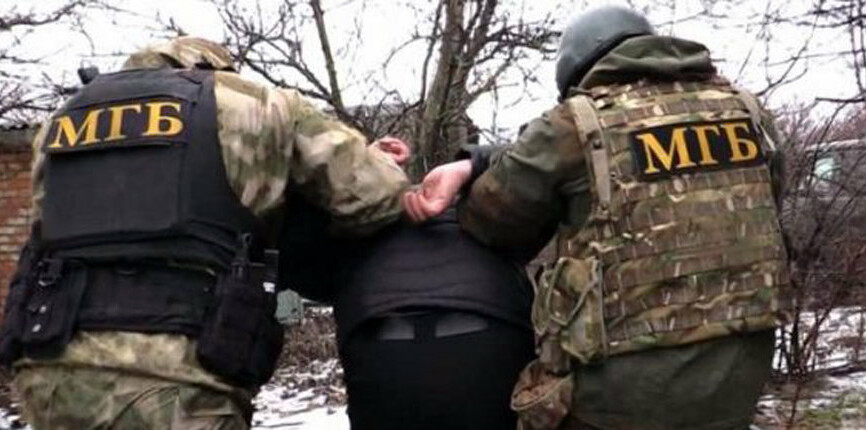Russian proxy Donetsk ‘republic’ formalize plunder of Ukrainians’ property

The self-proclaimed and Russian-controlled ‘Donetsk people’s republic’ [‘DPR’] have formalized seizure of Ukrainian state and municipal property, as well as the ‘nationalization’ of any unused property. It has, in fact, long been known that properties abandoned after Russian and Russian-controlled militants seized control in 2014 can be appropriated if left totally unattended. Denis Kazansky, a journalist formerly from Donetsk, believes that the ‘decree’ signed by ‘DPR leader’ Denis Pushilin regarding the seizure of any unused buildings or other property could also be used to get hold of property that has taken somebody’s fancy. Who, after all, is going to argue when the ‘courts’ are there to provide whatever ‘ruling’ is demanded of them and annoying those who wield power can get you thrown into a basement, or even the Izolyatsia secret prison in Donetsk, and tortured?
The ‘DPR parliament’ on 30 April passed two documents ‘nationalizing’ both property owned by Ukrainian banks and that owned by the Ukrainian state or municipal authorities. The ‘laws’ will allegedly make it possible to use the property “in the interests of ‘DPR’ and its citizens”. Typically, Maxim Knysh, head of the relevant committee, informed that the ‘law’ does not apply to banks which, as of 14 May 2014, were either Russian, like Sberbank, or had significant Russian shares.
Kazansky notes that this effective plunder is being presented as something positive. On the ‘DPR’s press agency site’, there is a detailed article about how a 40 metre crane was dismantled after having been abandoned in 2014. No mention, of course, is made of why the construction firm was forced to leave their property, nor why no such construction work is now underway. Kazansky is surely right that nobody in their right mind would invest in a Russian proxy ‘republic’ run by bandits and where there would be no question of the ‘courts’ protecting ones interests.
The ‘decree’ signed by Pushilin two days earlier officially transfers unoccupied property to the municipal authorities. Judging by earlier reports from, for example, Pavlo Lischansky, the former Ukrainian Human Rights Ombudsperson’s Representative in Donbas, such ‘transfers’ have long been practised both in ‘DPR’ and in the so-called ‘Luhansk people’s republic’. In August 2020, he stated that anybody with property, including cars, in occupied territory needed to constantly monitor the situation; make sure that all communal charges, etc. are paid and see if somebody can watch over the property.
There have been a number of occasions where the so-called ‘DPR ministry of state security’ have seized people who returned to occupied Donbas either to care for elderly relatives or to make sure that their flats were safe. The following are just two of many such cases.
Olena Piekh is 50 and suffers from epilepsy. She was a senior researcher at the Horlivka Art Museum until 2014, but left, with her adult daughter, Isabella, as soon as Russian and Russian-controlled militants seized Horlivka. They settled in Odesa, however Piekh’s mother remained in occupied Debaltseve, with her elder daughter. In 2015 the elderly lady suffered a stroke and needed treatment and long-term rehabilitation for which Piekh and her daughter organized the money. It was during a visit to see her mother in August 2018 and to bring money for this treatment that Olena Piekh was seized. It is known that she was subjected to beatings and torture (asphyxiation and electric shocks). She was sentenced on 27 March 2020 to 13 years for ‘spying and treason’. As Isabella Pyekh notes, her mother is the citizen of only one country – Ukraine, and it is only Ukraine, her motherland, that she could, but would not, betray.
50-year-old Marchenko’s torture at the hands of the ‘DPR militants’, his abduction to Russia and 10-year sentence there, all resulted from his fateful return to Donetsk in the hope of retrieving the sports car that he had dreamed of having since childhood. He had only been able to afford an old 1991 model Lamborghini Diablo which, unfortunately, needed major restoration and repair work, which normal mechanics would not take on. There was only one firm in Ukraine that would do it, and that had been involved in restoring the car since 2009 – NonStop, a Donetsk-based company.
The car was being restored when Donetsk was seized by the militants in 2014. Marchenko later discovered that it had been appropriated by Alexander Timofeyev, known as ‘Tashkent’, who was the so-called ‘minister of taxes and revenue’ under militant leader Alexander Zakharchenko. When the latter was killed in a bomb blast in August 2018, ‘Tashkent’ lost the ensuing battle for power and fled to Russia.
That was the disastrous point at which an acquaintance contacted Marchenko and told him there was a chance of getting the car back if he came to Donetsk with all the ownership papers.
Marchenko not only decided to try this, but did so in the worst of possible ways, travelling via Minsk through Moscow and across the Russian / militant controlled part of the border into occupied Donbas.
He was first seized by the Donetsk militants on 17 December 2018 and savagely tortured for two months at Izolyatsia. He was then taken across the border into Russia, where the FSB came up with their own preposterous charges, for which he was sentenced to 10 years. More details here.





